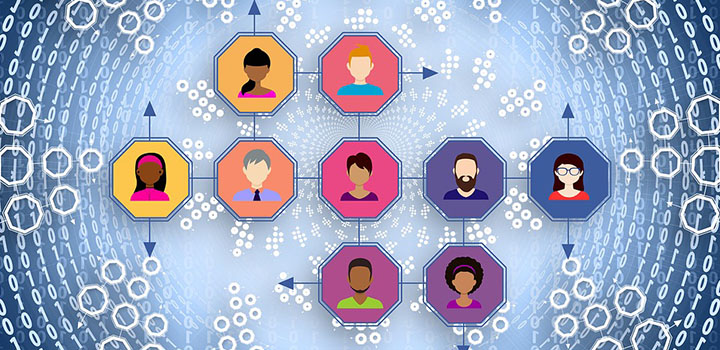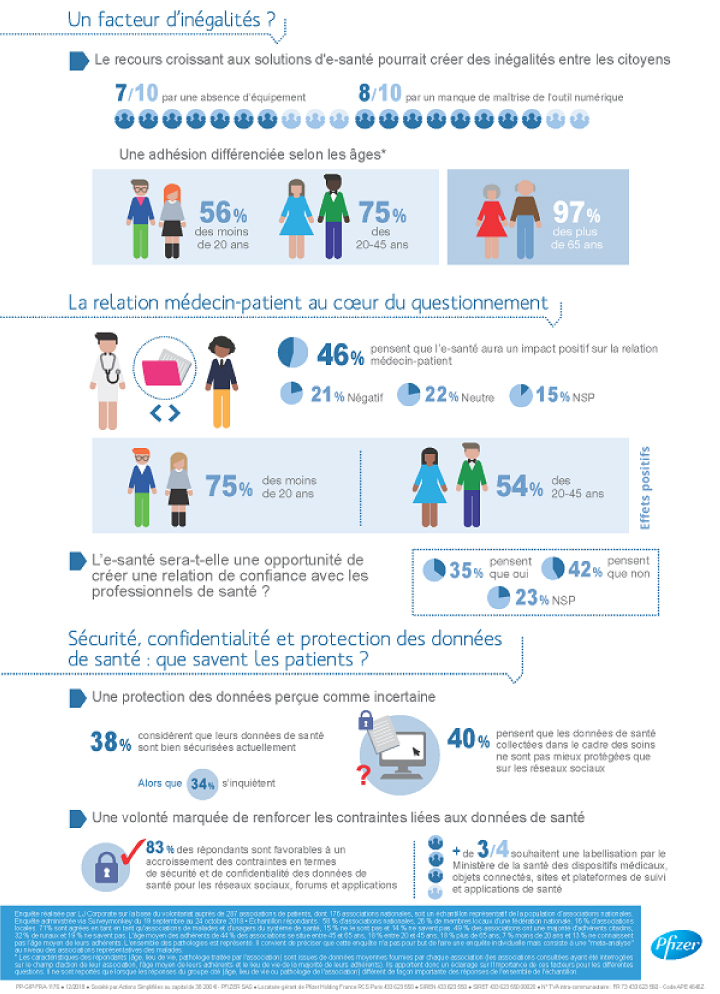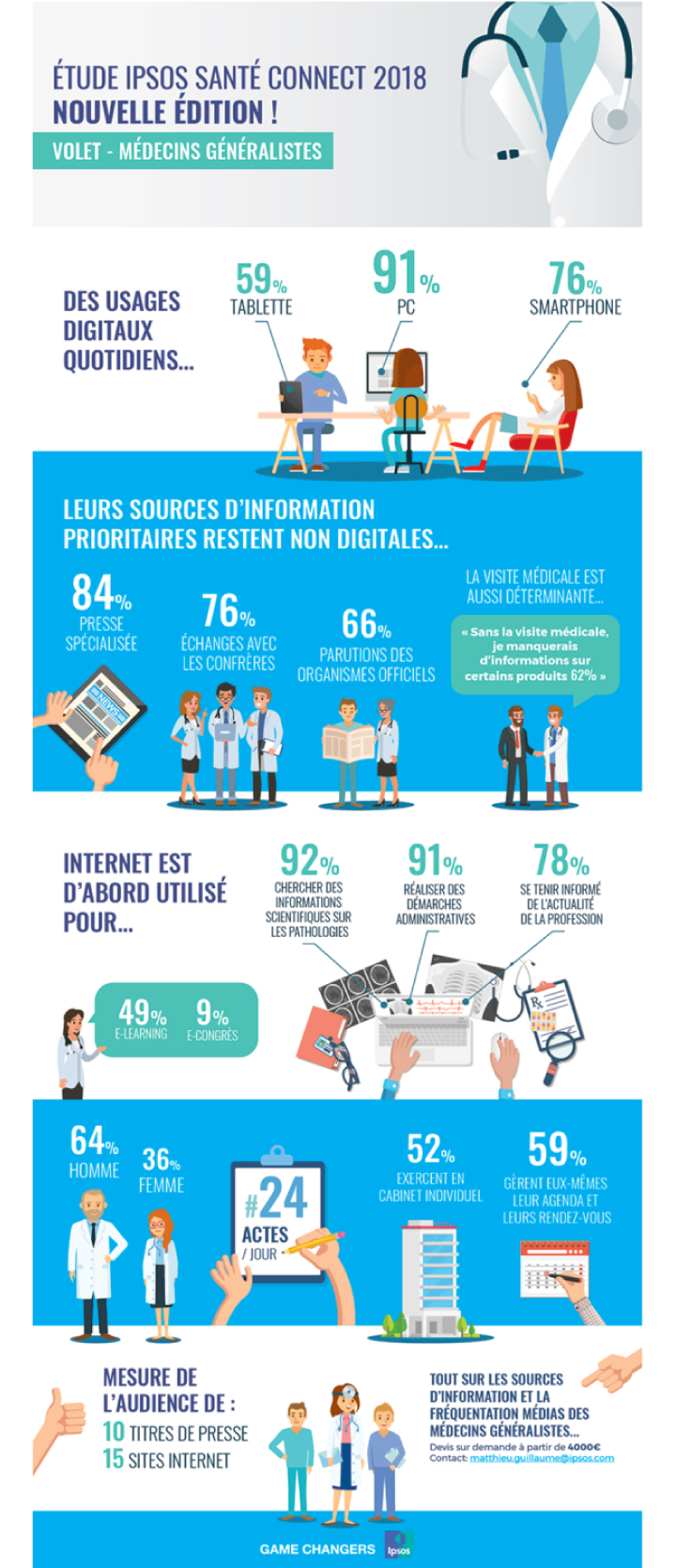
Key figures for the health and medical sector 2021
The digital health market is expected to be worth more than $230 billion worldwide in 2023, which is an increase of 160% from 2019. What is the place of digital technology among patients and healthcare professionals in France today? Here are a few figures from the health care market to help you see things more clearly.
New patient behaviour on the web
In the past, the patient consulted his doctor when he was ill or had questions about his health. Today, he turns first to the Internet and quickly decides for himself, without necessarily consulting. Over-the-counter (OTC) purchases of drugs are also on the rise.
- 68% of patients research OTC products
- 46% seek information about their symptoms
- 54% on treatments
- 46% on content related to well-being, nutrition and alternative medicine
- 36% check the health professional’s information on the web
- 45% make a decision within hours
- 55% of patients are not brand loyal.
Pfizer and Cercle P surveyed approximately 300 patient organizations for their views one-health. Respondents generally support digital technology, but have reservations about maintaining relationships between patients and healthcare professionals.
- 76% are in favour of the development of e-health
- 77% believe that digital technology is helping to reduce medical deserts
- 62% see e-health as having a positive impact on prevention, follow-up and adherence to treatment
- 72%, however, believe that e-health can create inequalities, including for patients who are not Internet literate (85%)
- 40% are not in favour of e-health for dependency and ageing
- 20% are afraid that the relationship between doctors and patients will deteriorate as a result of reduced interaction
- 6 out of 10 associations find that data is not sufficiently secure.
It is therefore necessary to continue to inform, support and reassure patients about the advantages of digital technology, especially among the elderly who fear a loss of human relationships.
Doctors and digital technology
In 2018, Ipsos offers a study on the use of digital by GPs.
They use different means of information and are not limited to a single channel of dissemination. They prefer the specialized press (84%) and official publications (66%) as well as exchanges with colleagues (76%), even though they use digital technology on a daily basis. Indeed, 91% of GPs use a computer every day.
They use the Internet to search for information on diseases (92%), to do administrative procedures (91%), to follow the news (78%) and to take e-learning courses (49%).
Health applications in figures
The number of applications on mobile phones continues to grow. In 2019, 204 billion apps were downloaded. What is the impact in the world of health? The Lab e-Santé, a think tank on digital health, has conducted two studies among health professionals and patients.
- 88% of healthcare professionals are equipped with a smartphone or tablet
- 65% use an application on a daily basis, which they choose by discussing with colleagues (55%) or by getting information (30%)
- 71% of patients have a smartphone or tablet
- Only 1 in 5 patients has ever downloaded a health application.
The place of social networks in health
Social networks and discussion forums are becoming more and more important in health information to the point of creating real communities on the Internet. Here are the results of a November 2018 survey conducted by the Healthcare Data Institute (HDI):
- 29% of respondents have talked about their health on the web
- 73% of them on social networks, 67% on forums and 29% on specialized communities
- 58% of respondents believe that testimonials from other patients provide important information
- 45% believe that these testimonies can contribute to the evolution of research.
The Healthperanto 360 barometer is another study carried out by health marketing students. It reveals that 60% of health communication will involve networks in 2019 compared to 23% in 2013. They take up a considerable amount of the information search, with Twitter and LinkedIn leading the way.
Are you looking for a communication agency specialised in health, medical or well-being? Welcome to Alioze
See also:
- Key figures of the beauty sector
- Key figures for the luxury sector
- Key figures for the fashion sector
- Key figures for the tourism sector
- Key figures for the food sector
- Key figures for the health sector
- Key figures for the real estate sector
- Key figures for the watchmaking sector
- Key figures for the education and teaching sector
- Key figures for the lawyers’ sector
- Key figures for the culture sector
- Key figures for the automotive sector
- Key figures for the wine and spirits sector
- Key figures for the children and youth sector
- Key figures for the hotel sector
- Key figures for the jewellery sector
Sources:
-
-
- buzz-esante.fr
- pro.webikeo.fr
- thinkwithgoogle.com
- lafnim.com
-











Leave a Reply
You must be logged in to post a comment.